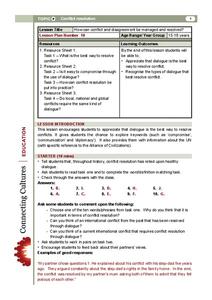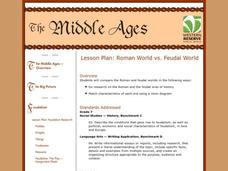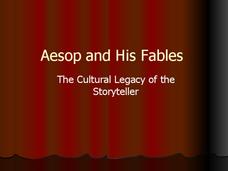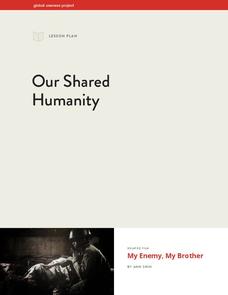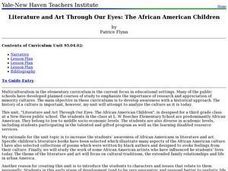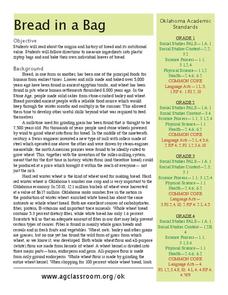Northeastern Educational Television of Ohio, Inc.
Feudalism Research
Working with a partner, young historians research different feudal roles in medieval Europe (i.e. nobles, knights, clergy, tradesmen, and peasants), create a fact sheet about their assigned roles, and present their findings to the class.
University of the Desert
How Can Conflict and Disagreement be Managed and Resolved?
As you explore the meaning of cultural understanding and diffusion with your learners, discuss how dialogue can play a role in resolving conflicts based on misunderstanding. Examine keywords such as compromise, communication, and...
Smithsonian Institution
Students’ Response to 9/11—A Documentary Report
Young historians research the devastating attacks of 9/11 and use that information to script their own documentaries. The follow-up activity includes recording the documentary and conducting classmate interviews,
US Institute of Peace
Defining Conflict
Before there can be peace, we have to understand conflict. Introduce the concept of conflict through a two-part activity that combines discussion, collaboration, and writing. The first in a 15-part series examines the multiple meanings...
US Institute of Peace
Observing Conflict
Can your class manage conflict? Give them the tools they need to succeed at conflict resolution with the third lesson in a 15-part series of peacebuilding activities. Learners draw from personal conflict experience as they analyze...
Baylor College
Microbes and Disease
Discuss how diseases have impacted human history. Divide your class into groups and assign each group one of the following: tuberculosis, malaria, plague, cholera, smallpox, and AIDS. They read up on, complete a concept map, and present...
Baylor College
Milestones in Microbiology
Life science learners read a set of six short Discovery Readings that describe historical events in the field of microbiology. For each, they identify clues about when the event occurred and then they try to arrange events in...
Baylor College
Energy for Life (Energy from Food)
Energy comes in many forms, but how do living things get the energy they need to survive and thrive? In a simple, controlled experiment with yeast, water, and sugar, groups make observations about how yeast reacts with water alone, then...
NASA
Building for Hurricanes: Engineering Design Challenge
"By the hair on your chinny-chin-chin, I'll huff and I'll puff and I'll blow your house in," says the big, bad wolf! Engineering hopefuls are challenged to design and construct a hurricane-proof building from simple office and craft...
NOAA
Sustaining Our Ocean Resources
Lead young scientists on an investigation of fishery practices with the final installment of this four-part unit. Using a PowerPoint presentation and hands-on simulation, this instructional activity engages children in learning how fish...
Curated OER
Civil War Literature Circle
Historical fiction can be a valuable asset when learning about the past. Integrate several novels written about the Civil War into your social studies unit, with groups of four working collaboratively to comprehend the novel from...
Northeastern Educational Television of Ohio, Inc.
Roman World vs. Feudal World
Young historians compare the major features of the Roman and feudal worlds, such as religion, social hierarchy, and political tenets, using online resources and group discussion.
Curated OER
Clowing Around: Ceramics
Clowns are a big hit with kids! Explore a few circus related websites to get an idea of how clowns look and what they do. They then build sculpting skills by creating expressive clown faces out of clay. Web links, materials list, and...
Active 770
Aesop and His Fables
Most people have heard of Aesop's Fables, but who was Aesop and when did the fables actually get recorded? Teach your class all about Aesop and fables in general with the presentation before inviting them to examine several fables and...
Global Oneness Project
Our Shared Humanity
Ann Shin's award-winning documentary, My Enemy, My Brother introduces viewers to Zahed Haftlang and Najah Aboud, two child soldiers on opposite sides during the Iran-Iraq war. After viewing the film, class members are asked to reflect on...
TryEngineering
Graphics: Bits and Points
What can a mural teach pupils about computer science? The lesson has scholars create a mural on a wall to learn about bitmap and vector graphics. Along the way, they learn about the graphics coordinate system.
National Math + Science Initative
Reading an Informational Text: "It All Started with Sputnik"
Sputnik was one of the greatest scientific advancements of the 1950s, and this reading lesson does it justice. Pupils start off with pre-reading questions and a video. They then read an excerpt from an article, which is accompanied by...
Bully Free Systems
Bully Free Lesson Plans—Seventh Grade
Having a hard time defining bullying with your seventh graders? Discuss the different types of behavior one would see in a bullying situation with a series of lessons, worksheets, and group activities.
US Holocaust Museum
Remember the Children: Daniel’s Story
Imagine being a child forced from your home and into a concentration camp during World War II. Scholars prepare for a visit to the United States Holocaust Museum by researching the children of the horrible event. They analyze...
Roy Rosenzweig Center for History and New Media
Founding Documents
Teach the class about the predecessor to Declaration of Independence—the Virginia Declaration of Rights. Using the foundational documents, scholars examine the two writings to consider how they are similar and how they are different. A...
Curated OER
EU and Turkey
Should Turkey be admitted to the European Union? Before debating this question, class members research the background and stated purpose of the EU, read articles of Turkey's bid to become a member of the EU, and the concerns other...
Curated OER
Literature and Art Through Our Eyes: African-American Artists
Examine the contributions of African-Americans in the worlds of art and literature. Over the course of a few days, young scholars will read and analyze a poem, a short story, and a piece of art. They complete a range of...
Curated OER
Bread in a Bag
Could the history of bread really be interesting? Yes, it could! An informational text gives scholars wheat production background from 8,000 years ago, discussing different types of bread and the current industry in Oklahoma. Learners...
Curated OER
"The Gambler" and "The Journey": A Comparison of Worlds in Two Short Stories
“The Gambler” and “The Journey” offer readers an opportunity to experience two very different views of Jewish life in Poland between WWI and WWII. Whether used as a part of a study of the Holocaust, or as a compare/contrast exercise, the...
Other popular searches
- Middle Ages Lesson Plans
- Middle Ages Feudalism
- Crusades of the Middle Ages
- Middle Ages Black Death
- Middle Ages Church
- Middle Ages Castles
- The Middle Ages
- High Middle Ages
- Middle Ages Literature
- Middle Ages Art Worksheets
- Disease Middle Ages
- Middle Ages Europe



